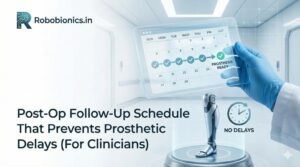
Post-Op Follow-Up Schedule That Prevents Prosthetic Delays (For Clinicians)
For many clinicians, the surgery is only the first step. What happens after the operation
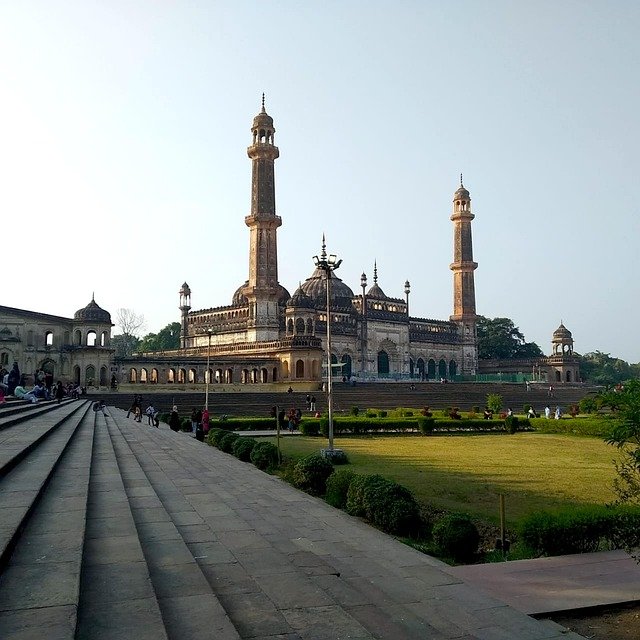
Lucknow is a city full of history, culture, and progress. From its busy markets to its modern hospitals, it is a place where tradition and innovation meet every day. But for many people living here, life takes an unexpected turn when they lose a hand or a leg. Suddenly, everyday tasks feel harder. Simple things like eating, writing, or going to work can become a struggle.
This is where prosthetic centers in Lucknow make a real difference. They do not just provide artificial limbs; they provide hope. And what makes Lucknow special is the growing support from government programs, Ayushman Bharat, and cashless treatment options. These schemes are opening doors for people who earlier thought prosthetics were out of their reach.
Imagine being able to walk into a clinic, get fitted with a modern prosthetic, and not have to worry about paying everything upfront. For families living on tight budgets, this changes everything. Prosthetics are no longer seen as luxury devices only for the wealthy. In Lucknow, they are becoming accessible, affordable, and within reach of the common man.
This blog will take you through how prosthetic services in Lucknow are shaping lives with the help of government tie-ups, insurance coverage, and cashless healthcare. We will explore what options are available, how the process works, and most importantly, how these solutions are giving people the chance to live fully again.

Lucknow is not only the capital of Uttar Pradesh but also one of the fastest-growing healthcare hubs in North India. The city has many government hospitals, private clinics, and charitable institutions. This mix makes it possible for people from all walks of life to find medical help.
While the city is famous for its heart care, cancer hospitals, and advanced surgeries, prosthetics has also started gaining focus. Specialized centers are opening up, and many hospitals now have tie-ups with prosthetic providers. This means people no longer need to travel far to bigger metros like Delhi for artificial limbs.
For years, one big challenge for people with limb loss was access. Prosthetics were either too expensive or simply not available nearby. In Lucknow, things are changing quickly. Government schemes, local NGOs, and private companies are ensuring that even those from villages around the city can get help.
Awareness programs have also made a big difference. Families who once thought prosthetics were out of their reach are now learning that modern artificial limbs are affordable, strong, and designed for daily use.
Government hospitals in Lucknow, such as King George’s Medical University (KGMU) and Dr. Ram Manohar Lohia Institute, are playing a major role in prosthetic services. Many of these hospitals have official tie-ups with prosthetic companies. This allows patients to access advanced prosthetics at reduced or even zero cost under specific schemes.
These tie-ups are vital for patients who cannot afford private treatment. For someone earning a modest income, a prosthetic hand or leg worth lakhs may seem impossible. But through these partnerships, the government steps in to cover costs.
Apart from hospitals, several NGOs and corporate social responsibility (CSR) programs work with prosthetic providers in Lucknow. They organize camps in rural areas, identify people in need, and bring them to the city for fittings.
These efforts create awareness and also reduce the burden on families. A farmer from a nearby village, for example, may not know about prosthetic options. But with NGO support, he can be guided to a center in Lucknow and fitted with a device that allows him to return to his fields.
Ayushman Bharat, also known as PM-JAY (Pradhan Mantri Jan Arogya Yojana), is one of the largest health schemes in the world. It provides coverage of up to ₹5 lakh per family per year for secondary and tertiary healthcare.
In Lucknow, Ayushman Bharat has made prosthetics more accessible. Families that hold a valid Ayushman card can now get coverage for prosthetic fittings under certain categories. This means they don’t need to pay out of pocket for the full device.
Earlier, prosthetics were seen as devices only for the wealthy. But with Ayushman Bharat, even low-income families can think about getting advanced prosthetic hands and legs.
A rickshaw puller who loses his leg in an accident, for example, may not have lakhs for treatment. But with Ayushman Bharat, he can walk into an empanelled hospital in Lucknow and be guided through a prosthetic fitting with little or no cost burden.
The scheme has also encouraged more people to come forward. Many amputees used to live quietly, hiding their disability, because they thought nothing could be done. Now, with Ayushman Bharat, awareness is spreading that help is available.
The fact that the scheme is cashless in empanelled hospitals makes it even easier. Families don’t need to worry about arranging loans or selling assets to pay upfront. This simple step has opened doors for thousands of people in Lucknow and nearby towns.

For most families, arranging money for healthcare is the hardest step. Even if they know treatment exists, the thought of arranging lakhs within days stops them from moving ahead. Cashless services change this completely.
In Lucknow, several hospitals and prosthetic providers now offer cashless treatments under Ayushman Bharat and private insurance. Patients simply show their insurance card, and the hospital takes care of the paperwork. The family does not have to stress about payments at every step.
Many private hospitals in Lucknow are now working with government schemes and private insurers to provide cashless prosthetic fittings. This model ensures smoother service for patients.
Instead of wasting weeks trying to arrange funds, patients can directly start the fitting process. For someone eager to return to work and daily life, this speed matters a lot.
Cashless systems also build trust between patients and healthcare providers. When families see that the hospital or prosthetic center is not pushing them for money at every step, they feel more comfortable. They can focus on recovery instead of finances.
This trust has played a big role in encouraging more people in Lucknow to choose prosthetics. Word of mouth spreads quickly in the city. When one person gets a prosthetic hand through a cashless scheme, their neighbors, relatives, and community members also feel inspired to seek help.
Lucknow is not only serving its own population but also becoming a hub for surrounding towns and villages. People from Barabanki, Sitapur, Raebareli, Hardoi, and even farther come to Lucknow for prosthetic services.
This regional pull shows the importance of government tie-ups and cashless systems. Without them, many of these families would never even dream of advanced prosthetics.
The city is unique because it respects its traditions while embracing innovation. This spirit is also seen in prosthetic services. Local centers are combining modern bionic hands with affordable options for rural workers. This balance ensures that no one is left out—whether they are a teacher, a farmer, or an IT professional.

Ramesh, a factory worker from Alambagh, lost his right hand in a machine accident. For months, he struggled with depression, unable to continue working and worried about supporting his family. When he heard about prosthetic services at a government hospital in Lucknow through Ayushman Bharat, he decided to give it a try.
With his Ayushman card, Ramesh was fitted with a mechanical prosthetic hand. It allowed him to return to lighter duties in the same factory. His confidence grew, and his family’s financial worries eased. For him, the scheme meant more than a medical device—it meant a second chance.
Nisha, a college student from Gomti Nagar, lost her leg in a road accident. Her biggest fear was that she would not be able to complete her studies or attend campus activities. Through an NGO tie-up with a Lucknow hospital, she was introduced to a prosthetic center that accepted Ayushman Bharat coverage.
She received a modern leg prosthesis, and with proper rehabilitation, she was able to walk independently again. Today, she continues her studies with her dream of becoming a teacher alive. Her story inspires other young students in Lucknow who feel limited by disability.
Shyam, a farmer from a nearby district, had an accident with a thresher machine. He could not afford private hospital care and thought his working days were over. Through a health camp run by an NGO, he was taken to Lucknow, where he received a prosthetic under a government tie-up program.
With his new mechanical hand, he returned to farming. The prosthetic may not have the full flexibility of a bionic hand, but it is strong enough to handle tools and farming equipment. For Shyam, this meant regaining dignity and independence.
The first step for families is to check if they are eligible under the Ayushman Bharat scheme. In Lucknow, this can be done by visiting an empanelled hospital or checking online through the PM-JAY website. Families need to have their Ayushman card ready, which acts like an insurance card.
Once eligibility is confirmed, the hospital guides the patient through the next steps. The process is simple and designed to reduce paperwork for patients.
The next step is to visit a hospital in Lucknow that is empanelled under Ayushman Bharat. Many government hospitals and private centers are part of this network. At the hospital, doctors assess the type of prosthetic required—whether it is for a hand, leg, or both.
The choice of prosthetic depends on the patient’s lifestyle and work needs. For someone in an office job, a bionic hand may be recommended. For a farmer, a strong mechanical hand may be more practical.
Once the type of prosthetic is chosen, the fitting process begins. This involves measurements, customization, and trials to ensure the prosthetic is comfortable. The patient is then trained in using it. Rehabilitation is critical, as it helps the patient adapt to the new device in daily life.
In Lucknow, many centers also provide physiotherapy and training sessions to help patients regain mobility faster. Families are encouraged to take part in this training, so they can support their loved ones at home.
One of the biggest hurdles for families in Lucknow has always been money. Even if they knew prosthetics existed, the upfront cost was beyond reach. Cashless services remove this barrier.
When patients can walk into a hospital, get fitted, and walk out without paying immediately, it changes their outlook. They no longer see healthcare as something unreachable. Instead, they see it as a right they can access.
Cashless services also mean faster treatment. Patients don’t need to spend weeks arranging funds. Instead, they can begin the prosthetic fitting process quickly, which speeds up recovery and helps them return to work sooner.
This speed is especially important in a city like Lucknow, where many families depend on daily wages. Every day without work is a day without income. By cutting financial delays, cashless prosthetic services protect both health and livelihood.
Word of mouth is powerful in Lucknow. When one person benefits from cashless prosthetics, their neighbors, friends, and extended family learn about it too. This creates a ripple effect of awareness.
More people come forward for treatment, hospitals see higher participation, and NGOs find it easier to spread information. Over time, this cycle ensures that prosthetic services reach even the most remote families.

Fitting a prosthetic is only the first step. Rehabilitation ensures that the person knows how to use it in daily life. Without training, many patients find it hard to adapt and may stop using the device altogether.
In Lucknow, rehabilitation programs are now given more importance. Patients are taught how to perform daily tasks like walking, eating, writing, or working with tools. This step-by-step training builds confidence and makes the prosthetic a natural extension of the body.
Families in Lucknow play a huge role in rehabilitation. By encouraging the patient to practice and supporting them through challenges, they make the process smoother. Prosthetic centers often involve family members in training sessions, so they know how to help at home.
Rehabilitation is not only physical but also emotional. Losing a limb is a traumatic experience, and many people feel depressed or anxious. Counseling and peer support groups in Lucknow are helping patients heal emotionally as they adapt to their prosthetics.
By addressing both body and mind, rehabilitation ensures long-term success for patients.
The combination of government tie-ups, Ayushman Bharat coverage, and cashless services makes Lucknow a strong example for other Indian cities. The model here shows that with the right partnerships, even complex treatments like prosthetics can become accessible to all.
Because of its strong healthcare network, Lucknow is now attracting patients from nearby towns and districts. Families travel hours to the city because they trust its hospitals and prosthetic centers. This regional pull is turning Lucknow into a healthcare hub for North India.
As awareness grows, Lucknow will likely see more specialized prosthetic centers opening. Technology like bionic hands and Sense of Touch prosthetics will become more common. With government backing and cashless systems, the city is set to lead the way in affordable prosthetic services.
For many years, prosthetic options in Lucknow were limited to basic mechanical devices. These provided strength but lacked flexibility. Now, things are changing. Bionic technology—prosthetics that respond to muscle signals—is becoming more common in the city.
These bionic devices allow users to perform delicate tasks like typing, holding a pen, or even cooking. By detecting natural muscle signals, they create a smoother, more intuitive experience. For office workers, students, and professionals in Lucknow, this technology is life-changing.
Some advanced prosthetic hands also come with feedback systems. These provide a sense of touch, allowing the user to know how much pressure they are applying. In a city like Lucknow, where people work in diverse fields from teaching to tailoring, this feature adds immense value.
Imagine a tailor being able to feel the tension of the fabric or a shopkeeper being able to count notes with precision. Sense of Touch prosthetics make such activities possible.
One of the reasons advanced prosthetics are becoming accessible in Lucknow is local manufacturing. Instead of relying on costly imports, Indian companies are building high-quality prosthetic components within the country. This reduces both cost and maintenance issues.
Local service centers also ensure faster support. If a device needs repair, patients in Lucknow no longer have to wait months for parts to arrive from abroad. This practicality makes advanced technology realistic for middle-class and working-class families.

Anita, a primary school teacher in Lucknow, lost her hand in a bus accident. She thought her career was over because she could not write on the board or hold books. With the help of a bionic prosthetic under Ayushman Bharat coverage, she learned to control the new hand using her muscle signals.
Within months, she was back in her classroom, writing on the board and interacting with students. Her return gave her confidence and inspired her students, many of whom saw resilience in action.
Iqbal, a rickshaw puller, lost his leg in a road accident. With no savings and a family of five, he believed he would spend the rest of his life dependent on others. At a government hospital in Lucknow, he was guided through Ayushman Bharat to receive a prosthetic leg.
With rehabilitation, he now runs a small tea stall near his home. While he may not pull rickshaws anymore, his independence is restored. For Iqbal, the prosthetic leg gave him not only mobility but also dignity.
Arjun, a software engineer, lost his hand in an accident. His biggest fear was losing his job. Through a prosthetic center in Gomti Nagar, he was fitted with a bionic hand capable of typing and handling gadgets. His company supported him with adjusted work hours during training.
Today, Arjun continues to work as a coder, proving that limb loss does not have to mean career loss. His story shows how advanced prosthetics combined with workplace support can keep young professionals active.
Lucknow is showing how strong partnerships can transform healthcare. Government hospitals provide access, while private companies bring in advanced technology. Together, they make prosthetics available to people across income levels.
Ayushman Bharat acts as the financial bridge. By covering the costs, it ensures that families are not crushed under medical bills. Prosthetic providers, on the other hand, ensure that devices are suited to Indian conditions and lifestyles.
NGOs in Lucknow are also crucial in spreading awareness. They run camps in rural areas, educate families, and bring patients to the city. Without these efforts, many people would remain unaware of their options.
The community also plays a role. When people see neighbors benefiting from prosthetics, they are encouraged to come forward. This collective spirit helps build a city where disability does not mean isolation.
What Lucknow is achieving with its partnerships can serve as a model for other Indian cities. By combining affordability, government support, and advanced technology, the city is showing how prosthetics can become a normal part of healthcare, not a luxury.
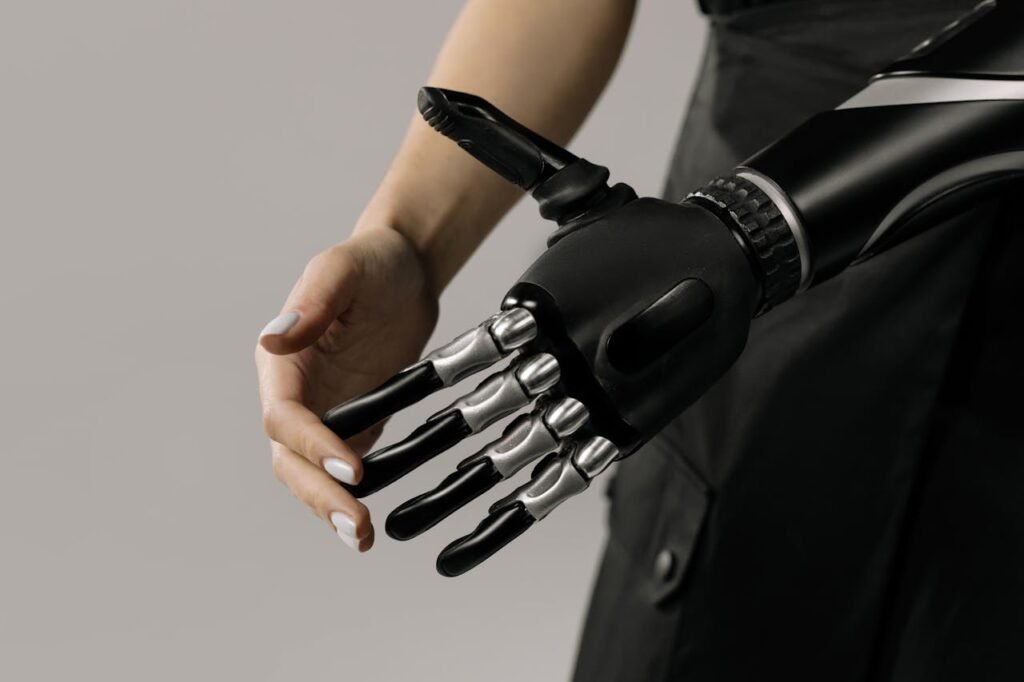
As awareness grows, more hospitals in Lucknow will likely join cashless systems. This will expand options for families and reduce waiting times. With better coordination between hospitals, prosthetic providers, and insurers, the system will only get smoother.
Technology providers are now working with insurers to create packages where prosthetic updates and maintenance are included in coverage. This will help patients upgrade their devices over time, ensuring long-term support.
For families in Lucknow, this means less stress about future costs. A prosthetic is not a one-time device—it needs adjustments, repairs, and sometimes replacement. Insurance-backed coverage will make these processes worry-free.
Given its central role in Uttar Pradesh, Lucknow has the potential to become a prosthetic hub for North India. With growing hospitals, advanced technology, and supportive policies, the city can lead the way in making prosthetics affordable and accessible for millions.
Lucknow is a city where tradition meets progress, and nowhere is this more evident than in its healthcare. Prosthetics in Lucknow are no longer distant dreams. They are real, accessible, and changing lives every day.
Through government tie-ups, Ayushman Bharat coverage, and cashless systems, families across income levels are finding new hope. A factory worker can return to his job, a student can walk back to her college, and a teacher can continue to inspire her students. These are not isolated stories—they are the new reality in Lucknow.
What makes this change powerful is the way partnerships have come together. Government hospitals, private companies, NGOs, and communities are working as one to ensure that prosthetics are not just devices but bridges to independence.
For the people of Lucknow, prosthetic services mean more than technology. They mean dignity, freedom, and the ability to dream again. And as the city grows into a hub for accessible prosthetics, it sets an example for the rest of India.
In the coming years, more lives will be touched, more families will find relief, and more people will walk back into the world with confidence. Lucknow is not just offering prosthetics. It is offering hope, one hand and one step at a time.

For many clinicians, the surgery is only the first step. What happens after the operation
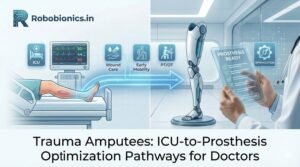
For trauma amputees, the journey does not begin at the prosthetic clinic. It begins much
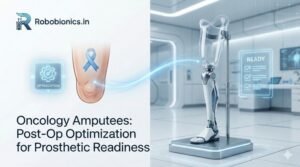
Amputation after cancer is not just a surgical event. It is the end of one
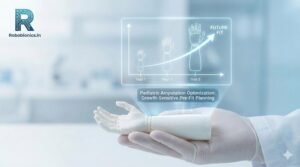
When a child loses a limb, the challenge is never only physical. A child’s body
Last updated: November 10, 2022
Thank you for shopping at Robo Bionics.
If, for any reason, You are not completely satisfied with a purchase We invite You to review our policy on refunds and returns.
The following terms are applicable for any products that You purchased with Us.
The words of which the initial letter is capitalized have meanings defined under the following conditions. The following definitions shall have the same meaning regardless of whether they appear in singular or in plural.
For the purposes of this Return and Refund Policy:
Company (referred to as either “the Company”, “Robo Bionics”, “We”, “Us” or “Our” in this Agreement) refers to Bionic Hope Private Limited, Pearl Haven, 1st Floor Kumbharwada, Manickpur Near St. Michael’s Church Vasai Road West, Palghar Maharashtra 401202.
Goods refer to the items offered for sale on the Website.
Orders mean a request by You to purchase Goods from Us.
Service refers to the Services Provided like Online Demo and Live Demo.
Website refers to Robo Bionics, accessible from https://robobionics.in
You means the individual accessing or using the Service, or the company, or other legal entity on behalf of which such individual is accessing or using the Service, as applicable.
You are entitled to cancel Your Service Bookings within 7 days without giving any reason for doing so, before completion of Delivery.
The deadline for cancelling a Service Booking is 7 days from the date on which You received the Confirmation of Service.
In order to exercise Your right of cancellation, You must inform Us of your decision by means of a clear statement. You can inform us of your decision by:
We will reimburse You no later than 7 days from the day on which We receive your request for cancellation, if above criteria is met. We will use the same means of payment as You used for the Service Booking, and You will not incur any fees for such reimbursement.
Please note in case you miss a Service Booking or Re-schedule the same we shall only entertain the request once.
In order for the Goods to be eligible for a return, please make sure that:
The following Goods cannot be returned:
We reserve the right to refuse returns of any merchandise that does not meet the above return conditions in our sole discretion.
Only regular priced Goods may be refunded by 50%. Unfortunately, Goods on sale cannot be refunded. This exclusion may not apply to You if it is not permitted by applicable law.
You are responsible for the cost and risk of returning the Goods to Us. You should send the Goods at the following:
We cannot be held responsible for Goods damaged or lost in return shipment. Therefore, We recommend an insured and trackable courier service. We are unable to issue a refund without actual receipt of the Goods or proof of received return delivery.
If you have any questions about our Returns and Refunds Policy, please contact us:
Last Updated on: 1st Jan 2021
These Terms and Conditions (“Terms”) govern Your access to and use of the website, platforms, applications, products and services (ively, the “Services”) offered by Robo Bionics® (a registered trademark of Bionic Hope Private Limited, also used as a trade name), a company incorporated under the Companies Act, 2013, having its Corporate office at Pearl Heaven Bungalow, 1st Floor, Manickpur, Kumbharwada, Vasai Road (West), Palghar – 401202, Maharashtra, India (“Company”, “We”, “Us” or “Our”). By accessing or using the Services, You (each a “User”) agree to be bound by these Terms and all applicable laws and regulations. If You do not agree with any part of these Terms, You must immediately discontinue use of the Services.
1.1 “Individual Consumer” means a natural person aged eighteen (18) years or above who registers to use Our products or Services following evaluation and prescription by a Rehabilitation Council of India (“RCI”)–registered Prosthetist.
1.2 “Entity Consumer” means a corporate organisation, nonprofit entity, CSR sponsor or other registered organisation that sponsors one or more Individual Consumers to use Our products or Services.
1.3 “Clinic” means an RCI-registered Prosthetics and Orthotics centre or Prosthetist that purchases products and Services from Us for fitment to Individual Consumers.
1.4 “Platform” means RehabConnect™, Our online marketplace by which Individual or Entity Consumers connect with Clinics in their chosen locations.
1.5 “Products” means Grippy® Bionic Hand, Grippy® Mech, BrawnBand™, WeightBand™, consumables, accessories and related hardware.
1.6 “Apps” means Our clinician-facing and end-user software applications supporting Product use and data collection.
1.7 “Impact Dashboard™” means the analytics interface provided to CSR, NGO, corporate and hospital sponsors.
1.8 “Services” includes all Products, Apps, the Platform and the Impact Dashboard.
2.1 Individual Consumers must be at least eighteen (18) years old and undergo evaluation and prescription by an RCI-registered Prosthetist prior to purchase or use of any Products or Services.
2.2 Entity Consumers must be duly registered under the laws of India and may sponsor one or more Individual Consumers.
2.3 Clinics must maintain valid RCI registration and comply with all applicable clinical and professional standards.
3.1 Robo Bionics acts solely as an intermediary connecting Users with Clinics via the Platform. We do not endorse or guarantee the quality, legality or outcomes of services rendered by any Clinic. Each Clinic is solely responsible for its professional services and compliance with applicable laws and regulations.
4.1 All content, trademarks, logos, designs and software on Our website, Apps and Platform are the exclusive property of Bionic Hope Private Limited or its licensors.
4.2 Subject to these Terms, We grant You a limited, non-exclusive, non-transferable, revocable license to use the Services for personal, non-commercial purposes.
4.3 You may not reproduce, modify, distribute, decompile, reverse engineer or create derivative works of any portion of the Services without Our prior written consent.
5.1 Limited Warranty. We warrant that Products will be free from workmanship defects under normal use as follows:
(a) Grippy™ Bionic Hand, BrawnBand® and WeightBand®: one (1) year from date of purchase, covering manufacturing defects only.
(b) Chargers and batteries: six (6) months from date of purchase.
(c) Grippy Mech™: three (3) months from date of purchase.
(d) Consumables (e.g., gloves, carry bags): no warranty.
5.2 Custom Sockets. Sockets fabricated by Clinics are covered only by the Clinic’s optional warranty and subject to physiological changes (e.g., stump volume, muscle sensitivity).
5.3 Exclusions. Warranty does not apply to damage caused by misuse, user negligence, unauthorised repairs, Acts of God, or failure to follow the Instruction Manual.
5.4 Claims. To claim warranty, You must register the Product online, provide proof of purchase, and follow the procedures set out in the Warranty Card.
5.5 Disclaimer. To the maximum extent permitted by law, all other warranties, express or implied, including merchantability and fitness for a particular purpose, are disclaimed.
6.1 We collect personal contact details, physiological evaluation data, body measurements, sensor calibration values, device usage statistics and warranty information (“User Data”).
6.2 User Data is stored on secure servers of our third-party service providers and transmitted via encrypted APIs.
6.3 By using the Services, You consent to collection, storage, processing and transfer of User Data within Our internal ecosystem and to third-party service providers for analytics, R&D and support.
6.4 We implement reasonable security measures and comply with the Information Technology Act, 2000, and Information Technology (Reasonable Security Practices and Procedures and Sensitive Personal Data or Information) Rules, 2011.
6.5 A separate Privacy Policy sets out detailed information on data processing, user rights, grievance redressal and cross-border transfers, which forms part of these Terms.
7.1 Pursuant to the Information Technology Rules, 2021, We have given the Charge of Grievance Officer to our QC Head:
- Address: Grievance Officer
- Email: support@robobionics.in
- Phone: +91-8668372127
7.2 All support tickets and grievances must be submitted exclusively via the Robo Bionics Customer Support portal at https://robobionics.freshdesk.com/.
7.3 We will acknowledge receipt of your ticket within twenty-four (24) working hours and endeavour to resolve or provide a substantive response within seventy-two (72) working hours, excluding weekends and public holidays.
8.1 Pricing. Product and Service pricing is as per quotations or purchase orders agreed in writing.
8.2 Payment. We offer (a) 100% advance payment with possible incentives or (b) stage-wise payment plans without incentives.
8.3 Refunds. No refunds, except pro-rata adjustment where an Individual Consumer is medically unfit to proceed or elects to withdraw mid-stage, in which case unused stage fees apply.
9.1 Users must follow instructions provided by RCI-registered professionals and the User Manual.
9.2 Users and Entity Consumers shall indemnify and hold Us harmless from all liabilities, claims, damages and expenses arising from misuse of the Products, failure to follow professional guidance, or violation of these Terms.
10.1 To the extent permitted by law, Our total liability for any claim arising out of or in connection with these Terms or the Services shall not exceed the aggregate amount paid by You to Us in the twelve (12) months preceding the claim.
10.2 We shall not be liable for any indirect, incidental, consequential or punitive damages, including loss of profit, data or goodwill.
11.1 Our Products are classified as “Rehabilitation Aids,” not medical devices for diagnostic purposes.
11.2 Manufactured under ISO 13485:2016 quality management and tested for electrical safety under IEC 60601-1 and IEC 60601-1-2.
11.3 Products shall only be used under prescription and supervision of RCI-registered Prosthetists, Physiotherapists or Occupational Therapists.
We do not host third-party content or hardware. Any third-party services integrated with Our Apps are subject to their own terms and privacy policies.
13.1 All intellectual property rights in the Services and User Data remain with Us or our licensors.
13.2 Users grant Us a perpetual, irrevocable, royalty-free licence to use anonymised usage data for analytics, product improvement and marketing.
14.1 We may amend these Terms at any time. Material changes shall be notified to registered Users at least thirty (30) days prior to the effective date, via email and website notice.
14.2 Continued use of the Services after the effective date constitutes acceptance of the revised Terms.
Neither party shall be liable for delay or failure to perform any obligation under these Terms due to causes beyond its reasonable control, including Acts of God, pandemics, strikes, war, terrorism or government regulations.
16.1 All disputes shall be referred to and finally resolved by arbitration under the Arbitration and Conciliation Act, 1996.
16.2 A sole arbitrator shall be appointed by Bionic Hope Private Limited or, failing agreement within thirty (30) days, by the Mumbai Centre for International Arbitration.
16.3 Seat of arbitration: Mumbai, India.
16.4 Governing law: Laws of India.
16.5 Courts at Mumbai have exclusive jurisdiction over any proceedings to enforce an arbitral award.
17.1 Severability. If any provision is held invalid or unenforceable, the remainder shall remain in full force.
17.2 Waiver. No waiver of any breach shall constitute a waiver of any subsequent breach of the same or any other provision.
17.3 Assignment. You may not assign your rights or obligations without Our prior written consent.
By accessing or using the Products and/or Services of Bionic Hope Private Limited, You acknowledge that You have read, understood and agree to be bound by these Terms and Conditions.